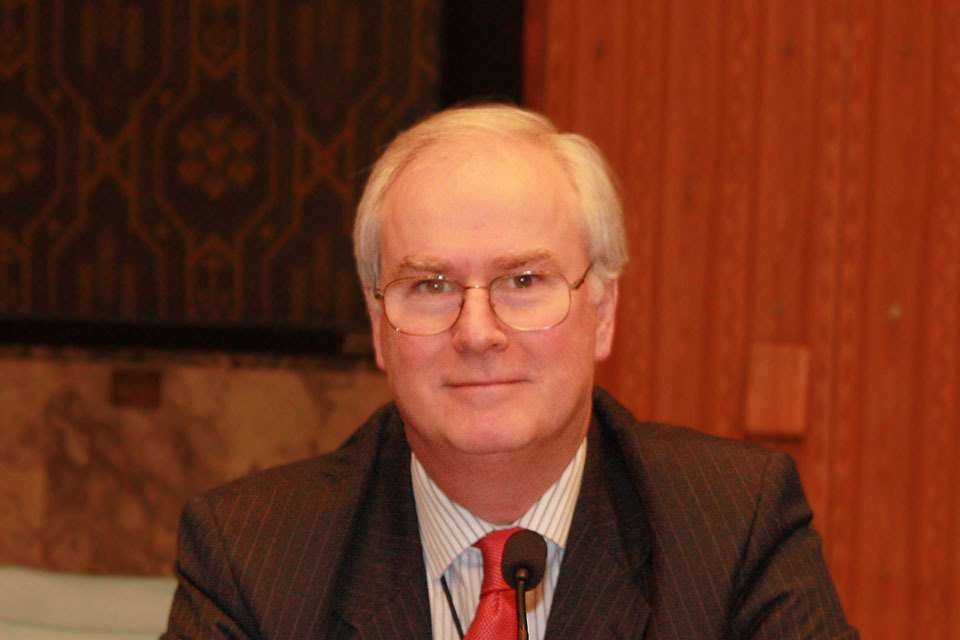"It is important that this Council continues to pay the closest attention to the situation in Ukraine"
Statement by Ambassador Mark Lyall Grant of the UK Mission to the UN, to the Security Council Meeting on Ukraine

Thank you Mr President.
I welcome the briefing today by Under-Secretary-General Feltman following his recent visit to Ukraine. A worrying surge in violence over the past week underlines the grave threat that the situation in east Ukraine continues to pose to international peace and security.
We were all shocked at the deaths of at least twelve civilians in Volnovakha earlier this month and by reports of hospitals being shelled in Donetsk. And we have seen yet more reports of Russian personnel and equipment crossing the Ukrainian border. In amongst this, we have heard the usual pattern of Russian denials and misinformation.
It is clear, just as it was when we last met in November, that Russia’s actions continue to undermine Ukraine’s sovereignty and territorial integrity, violating international norms and flouting the principles enshrined in the UN Charter.
The humanitarian impact of these actions is also clear. Over a million people have been displaced from their homes. As winter deepens, the situation will only get worse, with the elderly, young and infirm all increasingly vulnerable. The separatists must allow Ukrainian humanitarian convoys to enter the regions they control and Russia must stop using its unilateral humanitarian convoys as cover to supply those separatists with arms.
The human rights situation gives equal cause for concern, with human rights violations reported in the illegally annexed Crimean peninsula and a total breakdown in law and order in areas under separatist control.
Mr President,
Against this deteriorating context, it should dismay us all that repeated calls for a ceasefire, and for respect for Ukraine’s sovereignty and territorial integrity, have not been heeded. All sides must engage in constructive dialogue and bring about an end to violence in east Ukraine. Russia must take steps to withdraw its equipment and troops from Ukraine, cease its support for the separatists and effectively control its borders.
Despite persistent claims to the contrary, the evidence of Russia’s support is beyond denial. Two days ago, two companies of Russian troops, including up to 30 armoured personnel carriers and a dozen tanks were seen crossing the border into Ukraine. Daily, we see Russian soldiers operating alongside the separatists; we see separatists brandishing the PKP: Russia’s newest machine gun. We have also seen Russian supplied T-72 BM tanks in the streets of Luhansk and Donetsk. Neither the PKP nor the T-72 BM is used by the Ukrainian armed forces.
Mr President,
The consequences of the situation in the Donbas continue to hurt both the people and economies of Ukraine and Russia.
But there is a political way out – through implementation of the agreements that were reached in Minsk in September. However, despite a number of diplomatic initiatives, including today’s Normandy Format meeting, over 1,000 people have been killed since those commitments were made in September. And separatists have taken control of a substantial additional area of Ukrainian territory since the September agreements.
Indeed, any analysis of the implementation of the Minsk agreements lays bare the manifest failure of Russia and the separatists to implement ten out of the twelve commitments made on that occasion. In particular, Russia’s refusal to implement two key provisions continues to undermine the prospects for peace in Ukraine.
First, at Minsk, all sides agreed to “secure continuous monitoring on the Ukraine-Russian border and verification by the OSCE of the creation of a security zone in the border regions of Ukraine and Russia”. Despite the best efforts of the OSCE, whose work has been exemplary despite the challenges presented, only two checkpoints are currently monitored on the Russian side, leaving hundreds of kilometres free for the flow of weapons and personnel into Ukraine. If it is serious about Minsk, Russia must stop blocking the expansion of the OSCE border monitoring mission.
Secondly, at Minsk, all sides agreed to “remove illegal armed formations, military equipment, fighters and mercenaries from the territory of Ukraine”. Yet hundreds of Russian troops still remain on the territory of Ukraine, as do thousands of so-called ‘volunteers’, in flagrant violation of the protocol. The withdrawal of these forces is fundamental to the Minsk agreement and the only way to secure the future territorial integrity of Ukraine.
Mr President,
It is important that this Council continues to pay the closest attention to the situation in Ukraine and insists on further progress towards implementation of the Minsk agreements. Russia has chosen not to uphold its commitments and pursue this path to restoring stability. And Ukraine is sadly not the only case. Russia has made an agreement with the breakaway Georgian province of Abkhazia and is in the process of doing the same with another Georgian region, South Ossetia. This demonstrates a pattern of Russian interference in the domestic affairs of its neighbours and a blatant disregard for their sovereignty and territorial integrity.
We call on Russia to exert its influence over separatists, cease its destabilising activities and work in good faith to find a political solution. The Minsk agreements provide the framework for that solution. They must be implemented in full and without delay.
I thank you.